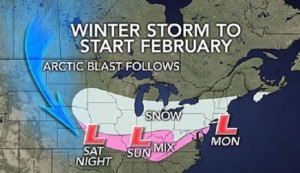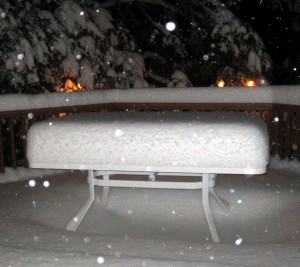This winter the Midwest has been short on snow. Though last year we’d had 50″ by this date, so far this year we’ve seen less than 8”…. until today.
 Last night a blizzard headed our way, starting to make snowy deposits on our neighborhood exactly when the iPhone weather app predicted: 8:00 pm. Heavy snow fell all night, and as I write, it’s been snowing all day, too. Predictions are for continued snow overnight until we’ve reached a grand total of 15”-18”.
Last night a blizzard headed our way, starting to make snowy deposits on our neighborhood exactly when the iPhone weather app predicted: 8:00 pm. Heavy snow fell all night, and as I write, it’s been snowing all day, too. Predictions are for continued snow overnight until we’ve reached a grand total of 15”-18”.
TV’s weather channel tells us this snowstorm has been given a name: Linus. Last week’s severe blizzard in New England also had a name: Juno. So, in addition to naming hurricanes, apparently we’re naming snowstorms now, too. We might as well name earthquakes, tornados, typhoons, and tsunamis. Giving each a name might help us keep them all straight: “Remember Linus? He was a doozy, but wasn’t he gorgeous?”
And then, as long as we’re naming storms, maybe we should name our personal storms, too. That might help us better recall our own histories. We could say, “I remember ‘Ethel.’ Boy, she was a wild one, wasn’t she?” Or, “I’ll never forget that ‘Ichabod.’ He nearly finished us off, but we made it through!”
 I think often about the storms of life. All of us know we gain more wisdom during difficult times than easy ones, but living through them is something else again. If given the option, we’d never choose all the trouble that comes to us, despite acknowledging that once we’re on the other side of it, we’ve learned a few things.
I think often about the storms of life. All of us know we gain more wisdom during difficult times than easy ones, but living through them is something else again. If given the option, we’d never choose all the trouble that comes to us, despite acknowledging that once we’re on the other side of it, we’ve learned a few things.
I wonder if God names the life-storms he allows to come to us. If he does, their titles are probably something like, “Victory over addiction,” or “Opportunity for Patience,” or “Triumph against Self-centeredness.” Surely if we could see our struggles not just as obstacles-to-get-past but opportunities-to-grow, we could live through them with less fretting and more anticipation.
 Meanwhile here in Southwest Michigan, as Linus continues to pour down on us, we’ll try to appreciate his beauty. We can also enjoy the chance to hone our driving skills and build new muscles from lots of extra shoveling.
Meanwhile here in Southwest Michigan, as Linus continues to pour down on us, we’ll try to appreciate his beauty. We can also enjoy the chance to hone our driving skills and build new muscles from lots of extra shoveling.
“When troubles of any kind come your way, consider it an opportunity for great joy.” (James 1:2)





